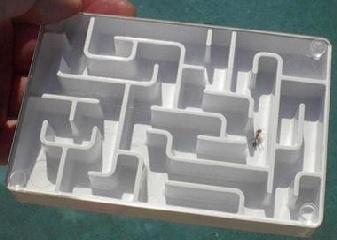

Fall 2009 TuTh 11:00-12:15 Room 103 Talbot Lab


|
Professor: Steve LaValle lavalle  uiuc.edu uiuc.edu 3318 Siebel Center Phone: 217-265-6313 Office Hrs: Tu 2-3pm, Th 3-4pm |
Teaching Assistants: Dima (Dmytro) Suvorov suvorov1  illinois.edu illinois.edu 0209 Siebel Center Phone: 217-721-9935 Office Hours: Mon 2-3pm |
Jingjin Yu jyu18  uiuc.edu uiuc.edu 0209 Siebel Center Phone: 217-333-0377 Office Hours: Wed 2-3pm |
Reza Zamani zamani  uiuc.edu uiuc.edu 0209 Siebel Center Phone: 217-???-???? Office Hours: Fri 3-4 pm |
Some "practice" complexity problems are posted here.
Midterm2 solution is posted here.
Mock midterm2 is posted here.
A brief solution to midterm1 is posted here.
A mock midterm is posted here.
The prerequisites for this course are CS 125 (or ECE 190), CS 173 (or MATH 213), and CS 225.
To assess the mathematical side of your background, read Chapter 0 of the Sipser textbook. You might not be able to produce all the details from memory, but almost all of it should look like something you either know or used to know.
Other experience, such as advanced math courses, may be able to serve in lieu of these prerequisites, especially CS 225. If you are still uncertain about whether you have sufficient background, ask Steve LaValle.
Recommended: J. Hopcroft and J. Ullman, Introduction to Automata Theory. Languages and Computation, Addison-Wesley, 1979 (or the 2nd Edition, 2001, by J. Hopcroft, R. Motwani, and J. Ullman).
All exams will be closed book and closed notes. No calculators are allowed.
We will use Illinois Compass for online grade posting.
| Homeworks | 20% |
| Midterm Exam 1 | 20% |
| Midterm Exam 2 | 20% |
| Final Exam | 40% |
In previous terms, this course has given about 20% As, 30% Bs, 30% Cs, 15% Ds, and 5% Fs. We expect the grading scale to be no more harsh than this. As the term progresses, we will try to keep you informed about where we think you stand in terms of letter grade. We will give a grade of C- or above to students whose grasp of the material makes them adequately prepared to succeed in the following CS courses (CS 421 and 473). We only plan to give a handful of Fs. Normally, most Fs involve students who stopped even attempting to do the work, often very early in the term, but mysteriously never dropped the course. Ideally, we would like everyone either drop the course early on, or else pass it.
Except for cases of simple arithmetic mistakes, the entire homework or exam will be regraded very carefully from scratch. We intend to take regrade requests very seriously and will give use the greatest care possible in reconsidering the evaluation of points; however, frivolous regrade requests will be met with the scorn and derision they deserve. It could be possible that more points are taken off, if more errors are discovered as a result of the regrading. We will readily admit, apologize for, and correct our mistake if you have been unfairly graded; such mistakes are bound to occur for a class of this size. Please note that out notion of fairness means you were graded no more harshly (nor more leniently) than other people in the class. Thus, it does not refer to your own opinion of whether you deserve more points for incomplete or partially correct answers. Such opinions are usually subjective; rather than debate, we can only offer our own opinion of how much credit various answers are worth, and then try our best to treat everyone the same way.